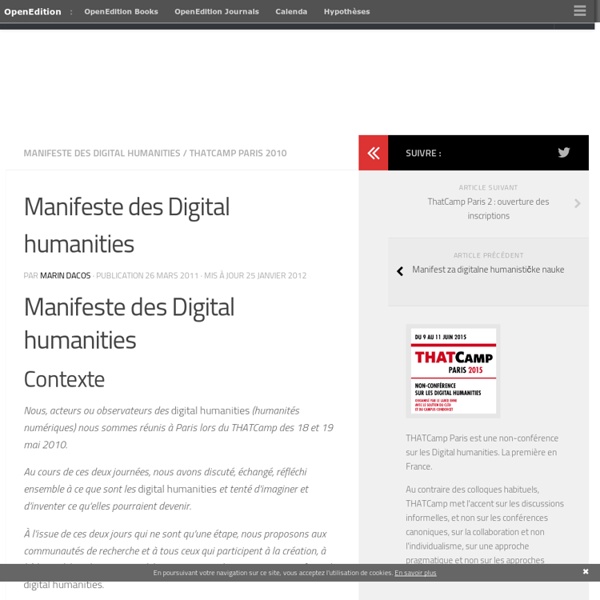



2018 Managing 100 Digital Humanities Projects: Digital Scholarship & Archiving in King’s Digital Lab James Smithies, King's College London; Carina Westling, King's College London; Anna-Maria Sichani, King's College London; Pam Mellen, King's College London; Arianna Ciula, King's College London Modelling Medieval Hands: Practical OCR for Caroline Minuscule Digital humanities The Digital Humanities are an area of research, teaching, and creation concerned with the intersection of computing and the disciplines of the humanities. Developing from the fields of humanities computing, humanistic computing,[2] and digital humanities praxis (dh praxis[3]) digital humanities embrace a variety of topics, from curating online collections to data mining large cultural data sets. Digital humanities (often abbreviated DH) currently incorporate both digitized and born-digital materials and combine the methodologies from traditional humanities disciplines (such as history, philosophy, linguistics, literature, art, archaeology, music, and cultural studies) and social sciences [4] with tools provided by computing (such as data visualisation, information retrieval, data mining, statistics, text mining) and digital publishing. Objectives[edit] A growing number of researchers in digital humanities are using computational methods for the analysis of large cultural data sets.
Centre de Recherches Interdisciplinaires Centre de Recherches Interdisciplinaires There are few steps to follow before becoming a Master EdTech student. You must fill the application form, which is quite long and require some preparation and specific pieces of information, make sure you have everything that is needed. Please note that you will be asked to attached some documents: your curriculum vitaeletters of recommendationID photoa copy of your last diploma*a copy of your grades transcript for this diploma* *If you do not have these documents yet, please not they will be required as soon as you have them.
Debates in the Digital Humanities Encompassing new technologies, research methods, and opportunities for collaborative scholarship and open-source peer review, as well as innovative ways of sharing knowledge and teaching, the digital humanities promises to transform the liberal arts—and perhaps the university itself. Indeed, at a time when many academic institutions are facing austerity budgets, digital humanities programs have been able to hire new faculty, establish new centers and initiatives, and attract multimillion-dollar grants. Clearly the digital humanities has reached a significant moment in its brief history. But what sort of moment is it? Debates in the Digital Humanities brings together leading figures in the field to explore its theories, methods, and practices and to clarify its multiple possibilities and tensions.
Field Notes: Building Data Dictionaries – Haystacks The scariest ghost stories I know take place when the history of data — how it’s collected, how it’s used, and what it’s meant to represent — becomes an oral history, passed down as campfire stories from one generation of analysts to another like a spooky game of telephone. These stories include eerie phrases like “I’m not sure where that comes from”, “I think that broke a few years ago and I’m not sure if it was fixed”, and the ever-ominous “the guy who did that left”. When hearing these stories, one can imagine that a written history of the data has never existed — or if it has, it’s overgrown with ivy and tech-debt in an isolated statuary, never to be used again. The best defense I’ve found against relying on an oral history is creating a written one. Enter the data dictionary. As part of my role as a lead data scientist at a start-up, building a data dictionary was one of the first tasks I took on (started during my first week on the job).
About » THATCamp Theory 2012 For more information about THATCamp in general, see the central THATCamp website at thatcamp.org and/or write the central THATCamp Coordinator at info@thatcamp.org. What is a THATCamp? THATCamp stands for “The Humanities and Technology Camp.” One-Minute Paper INTRODUCTION: A “one-minute paper” may be defined as a very short, in-class writing activity (taking one-minute or less to complete) in response to an instructor-posed question, which prompts students to reflect on the day’s lesson and provides the instructor with useful feedback. This strategy was originally developed by a Physics professor at the University of California, Berkeley (cited in Davis, Wood, & Wilson, 1983), then popularized by Cross and Angelo (1988) as one of a wide variety of quick “classroom assessment techniques” (CATs)—designed to provide instructors with anonymous feedback on what students are learning in class. For example, students write a one-minute paper in response to such questions as, “What was the most important concept you learned in class today? Or, “What was the ‘muddiest’ or most confusing concept covered in today’s class?”
Six Provocations for Big Data The era of Big Data has begun. Computer scientists, physicists, economists, mathematicians, political scientists, bio-informaticists, sociologists, and many others are clamoring for access to the massive quantities of information produced by and about people, things, and their interactions. Diverse groups argue about the potential benefits and costs of analyzing information from Twitter, Google, Verizon, 23andMe, Facebook, Wikipedia, and every space where large groups of people leave digital traces and deposit data. Significant questions emerge. Will large-scale analysis of DNA help cure diseases? There’s no such thing as a “tech person” in the age of AI When I was an undergrad at MIT, and later an engineer in Silicon Valley, I always felt like a bit of a black sheep because of my perpetual desire to straddle technology and the humanities. That went against the culture of both worlds, indicative of a broader impulse globally to separate the two. In hindsight, this separation hasn’t served us so well.